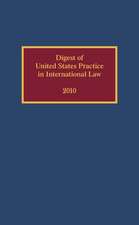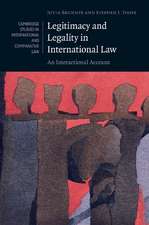Internal War and the Search for Normative Order
Autor Roscoe Ralph Oglesbyen Limba Engleză Paperback – 1971
Preț: 380.07 lei
Nou
Puncte Express: 570
Preț estimativ în valută:
72.73€ • 76.12$ • 60.53£
72.73€ • 76.12$ • 60.53£
Carte tipărită la comandă
Livrare economică 31 martie-14 aprilie
Preluare comenzi: 021 569.72.76
Specificații
ISBN-13: 9789401184854
ISBN-10: 9401184852
Pagini: 156
Ilustrații: 142 p.
Dimensiuni: 155 x 235 x 8 mm
Greutate: 0.23 kg
Ediția:1971
Editura: SPRINGER NETHERLANDS
Colecția Springer
Locul publicării:Dordrecht, Netherlands
ISBN-10: 9401184852
Pagini: 156
Ilustrații: 142 p.
Dimensiuni: 155 x 235 x 8 mm
Greutate: 0.23 kg
Ediția:1971
Editura: SPRINGER NETHERLANDS
Colecția Springer
Locul publicării:Dordrecht, Netherlands
Public țintă
ResearchCuprins
I. Historical Development of Belligerent Recognition.- 1. The American Revolution.- 2. Spanish Colonial Wars for Independence, 1810–1823.- II. Pre-1861 Civil Conflicts which Indicated a Need for the Status of Insurgency.- 1. The Greek Insurrection Against the Sublime Porte, 1821.- 2. The Polish Uprising, 1830–31.- 3. The Canadian Insurrection, 1838–39.- 4. The Revolution of Texas, 1836.- 5. The Vivanco Insurrection in Peru, 1856–1858.- III. Methods of According Belligerent Recognition.- 1. The American Civil War and Development of the Concept of Belligerence.- 2. Nature and Form of Recognition: By Third States.- 3. Recognition by Foreign States.- 4. Nature and Form of Recognition: by the Parent Government.- 5. The Source of Recognition.- IV. Criteria for Timing a Grant of Belligerence.- 1. The American Argument for the Appropriate Timing of Belligerent Rights.- 2. The British Position.- 3. The View of Scholars and Publicists on the Matter of Recognition.- 4. The Geneva Arbitrations and the Question of Premature Recognition.- 5. Criteria for Timing a Grant of Belligerent Recognition.- 6. The Question of a Right of Recognition.- 7. May the Established Government Demand Belligerent Recognition as of Right ?.- V. Belligerent Recognition as de Facto Recognition of the Insurgent Government.- 1. Essential Informal Relations With an Insurgent Government.- 2. Judicial Decisions Respecting De Facto Nature of Insurgent Governments.- 3. Norms of De Facto Recognition of the Insurgent Government.- 4. The Uses of De Facto Recognition.- VI. Succession to Treaty Responsibilities in Civil Wars.- 1. The Traditional Law of Treaty Succession.- 2. Success or Failure as a Criterion for Treaty Succession.- 3. Effects of Recognition of Belligerency on Treaty Succession.- 4. Successionto Multipartite Treaties When Belligerency has been Recognized.- 5. Treaty Succession in Internal Wars Since The American Civil War.- VII. The Decline of Belligerent Recognition: Desuetude in International Law.- 1. Belligerent Recognition After the American Civil War.- 2. Reasons for the Non-Use of Belligerent Recognition.- 3. Belligerent Recognition and Desuetude.- VIII. Some Observations on Current Practice.- 1. The Nature of the System Change.- 2. The Decline of Insurgent Recognition.- 3. The Modality of Intervention.- 4. Patterns of Intervention.- 5. Developing Patterns of Bloc Intervention.- 6. Toward an International Law of Civil Conflicts.- 7. Tables of Interventions in Civil Wars, 1945–1967.- 8. Summary.














